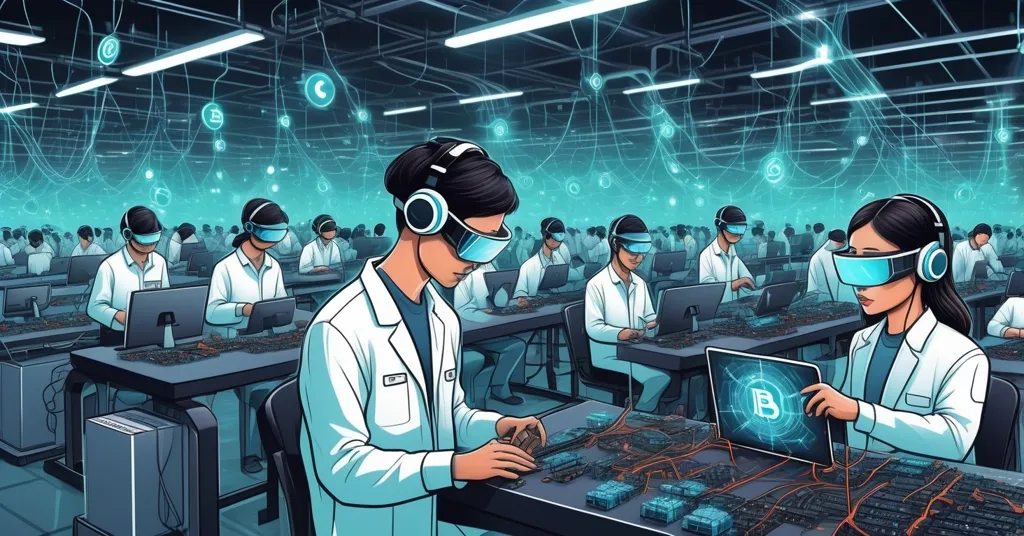Apple Shifts Vision Pro Production to Vietnam: Crypto Hardware Implications Explored

Apple’s Vision Pro Moves to Vietnam: A Tech Shift with Crypto Implications
Apple has dropped a bombshell by shifting production of its revamped Vision Pro headset—now powered by the cutting-edge M5 processor—from China to Vietnam. This isn’t just a manufacturing tweak; it’s a bold play in a high-stakes game of geopolitical chess, dodging Trump-era tariffs and supply chain risks while potentially setting the stage for decentralized tech to hitch a ride on Apple’s hardware wave.
- Production Pivot: Vision Pro with M5 chip now made in Vietnam, not China.
- Global Diversification: Apple expands to Vietnam, India, and beyond to sidestep China reliance.
- Blockchain Potential: Could Apple’s hardware unlock new decentralized use cases?
Why Vietnam? Unpacking Apple’s Manufacturing Gamble
For decades, China has been Apple’s manufacturing backbone, churning out everything from the debut Vision Pro headset with its M2 chip (launched in February 2024) to the lion’s share of iPhones. But the landscape has shifted under the weight of geopolitical friction. Tariffs on Chinese imports, introduced during Donald Trump’s presidency to boost U.S. manufacturing and curb trade imbalances, have made over-reliance on China a liability. Add to that rising labor costs and supply chain vulnerabilities exposed by global disruptions like the COVID-19 pandemic, and Apple’s had to rethink its strategy. Enter Vietnam—a rising star in tech production, now home to the redesigned Vision Pro headset (complete with a more comfortable band) as well as a lineup of other products including AirPods, iPads, HomePods, and Apple Watches. This Southeast Asian nation offers cost advantages and government incentives, making it a strategic bet for Apple to diversify and build resilience against trade wars or political spats that could halt operations overnight.
But Vietnam isn’t flying solo in this diversification saga. Apple’s casting a wide net. In India, a growing number of iPhones for U.S. buyers are assembled to bypass those hefty tariffs on Chinese goods. Thailand and Malaysia are stepping up with Mac components, while Indonesia crafts mesh parts for AirPods Max through a government partnership. Even the U.S. is getting a slice of the pie, with Corning Inc. producing cover glass for iPhones and Apple Watches, and the premium Mac Pro being assembled in Texas. This isn’t just about spreading the workload; it’s about crafting a supply chain that can weather any storm. For us in the crypto space, there’s a tantalizing angle: cheaper production in emerging hubs like Vietnam could eventually lower the cost of hardware—think ASIC miners for Bitcoin or devices running blockchain apps—making decentralized tech more accessible to the masses. Though hard data on this impact is scarce, the potential is worth watching.
Smart Home and Beyond: Apple’s Vietnamese Ambitions
Apple’s plans for Vietnam don’t stop at headsets and earbuds. They’re gearing up to assemble a suite of next-generation smart home devices there, including a smart display, a home security camera, and a tabletop robot that sounds like it’s ripped from a futuristic blockbuster. Here’s where it gets intriguing: Apple has partnered with Chinese electric vehicle giant BYD for final assembly, testing, and packaging of these gadgets in Vietnam. Yes, a Chinese firm in the mix despite the pivot away from China—ironic, but a pragmatic nod to BYD’s manufacturing muscle. These devices could open doors for blockchain integration, especially in the realm of privacy and security. Imagine a smart home camera using a protocol like IOTA or Helium to encrypt data on a decentralized ledger, ensuring your footage isn’t just another file in a corporate cloud. While Apple hasn’t hinted at such plans, the hardware evolution they’re driving could lay the groundwork for decentralized systems to sneak into mainstream homes.
Foldable Flops: Apple’s Innovation Hits a Wall
On the product innovation front, Apple’s stumbling in a race where rivals like Samsung are already lapping the field. A foldable iPad, speculated to feature an 18-inch OLED display (a screen tech known for vivid colors and energy efficiency) and a staggering $3,000 price tag, was initially pegged for a 2028 release. But engineering hurdles—weight issues, tricky hinge designs, and display tech that’s a nightmare to perfect—have pushed that timeline to 2029 or beyond. Apple’s collaborating with Samsung Display Co. to develop a massive foldable panel that minimizes the annoying crease typical of such devices, but perfection takes time. Similarly, the hyped foldable iPhone, once rumored for 2026, is now delayed to 2027 at the earliest. For a company obsessed with polish, these setbacks sting. Samsung’s folding phones are bending the market while Apple’s still ironing out the kinks—literally.
These delays aren’t just a tech gossip tidbit; they could ripple into the crypto world. Foldable devices, with their portable, dual-screen potential, could serve as mobile hubs for managing decentralized wallets or dApps on the go. A delay means slower rollout of hardware that might natively support blockchain use cases, potentially ceding ground to competitors who get there first. On the flip side, Apple’s insistence on quality over speed might ensure that when they do launch, the integration is seamless—assuming they even care to embrace decentralized tech, which brings us to a thornier debate.
Apple and Decentralization: A Match Made in Hell?
Let’s get real: Apple’s ecosystem is a walled garden, meticulously controlled from app approvals to hardware specs. This clashes hard with the open, permissionless ethos of blockchain and Bitcoin. Could the Vision Pro, with its augmented reality (AR) prowess, really mesh with decentralized metaverse platforms like Decentraland or Somnium Space, where NFTs power virtual economies? It’s a tantalizing thought—managing a Bitcoin wallet in a 3D space or trading tokenized assets through Apple’s headset could be a game-changer for adoption. But Apple’s history screams caution. They’ve never been keen on letting users tinker outside their sandbox. Any blockchain integration would likely be on their terms, if at all, and that’s a bitter pill for those of us championing true decentralization. Call it a devil’s advocate take, but we might be dreaming if we think Apple will hand over the keys to a permissionless future without a fight—or serious regulatory prodding.
Still, the potential can’t be ignored. Vietnam’s manufacturing boom might slash hardware costs, indirectly fueling accessibility for Bitcoin miners or Ethereum stakers needing affordable rigs (even if we’re talking pre-merge GPU days for the latter). Apple’s smart home gear could, in a wild stretch, adopt blockchain for data sovereignty—think owning your smart camera feed as an NFT rather than Apple owning it. And while iPhone production largely sticks to China for global markets, India’s growing role for U.S. units shows Apple can adapt under pressure. If tariffs or geopolitics push harder, could we see crypto-friendly hardware become a strategic focus to tap new markets? It’s speculative as hell, but in the spirit of effective accelerationism, let’s root for disruption—Apple might not see it yet, but they could be paving the way for decentralized tech to infiltrate the mainstream. We’re damn well here for it.
Key Takeaways and Questions
- Why is Apple moving Vision Pro production to Vietnam?
Geopolitical tensions and tariffs on Chinese imports from the Trump era are forcing Apple to diversify its supply chain, with Vietnam emerging as a cost-effective hub to mitigate risks and maintain production stability. - What does this shift mean for blockchain hardware accessibility?
Lower production costs in places like Vietnam could eventually reduce prices for devices supporting blockchain apps or Bitcoin mining hardware, though concrete impacts remain unclear without hard data. - Can the Vision Pro boost decentralized AR/VR adoption?
Potentially—its AR capabilities could pair with platforms like Decentraland for tokenized virtual experiences, but Apple’s closed ecosystem might throttle true decentralization unless user or regulatory pressure forces change. - Do foldable device delays hinder crypto-friendly tech?
Indirectly, yes. Delayed foldables slow the arrival of portable devices ideal as mobile crypto hubs, potentially letting competitors capture this niche first, though Apple’s quality focus might pay off long-term. - Could Apple’s smart home devices integrate blockchain security?
There’s a slim chance blockchain protocols like IOTA could secure data on Apple’s upcoming smart home gear for enhanced privacy, but Apple’s track record suggests reluctance to embrace open, decentralized systems.
Apple’s strategic pivot to Vietnam with the Vision Pro and beyond isn’t just a tech headline—it’s a glimpse into how global forces shape the hardware that might one day power our decentralized dreams. Whether they’re crafting headsets, delaying foldables, or eyeing smart home domination, Apple’s moves ripple far beyond Cupertino. For Bitcoin maximalists, the hope is secure wallet integrations or mining accessibility; for altcoin advocates, Ethereum’s smart contracts could dominate AR/VR dApps on Apple’s turf. Either way, we’re watching a giant stumble through innovation and geopolitics, and damn if it isn’t a fascinating mess. Let’s see if decentralization can sneak through the cracks of their walled garden—or if we’ll have to kick the gates down ourselves.



